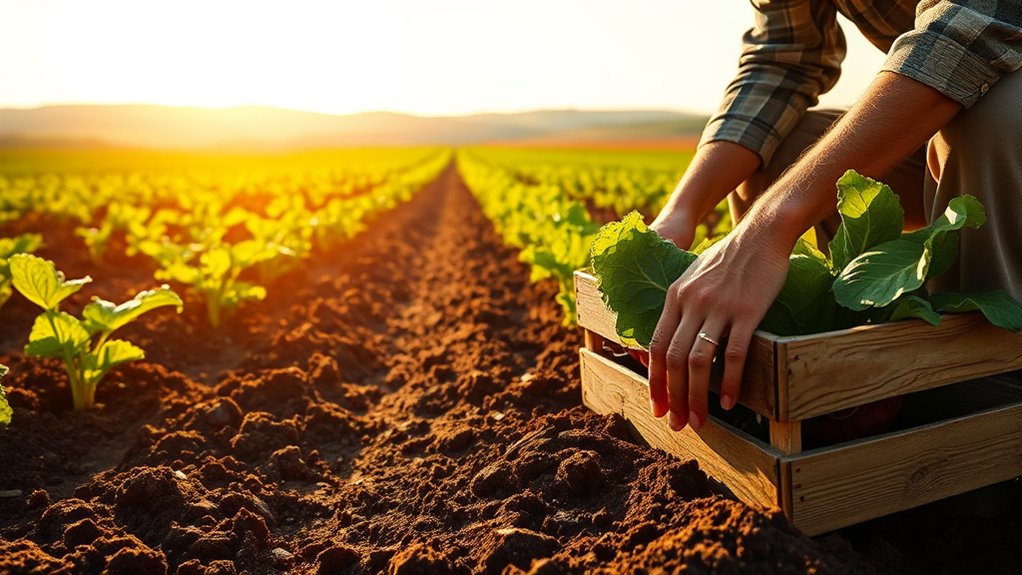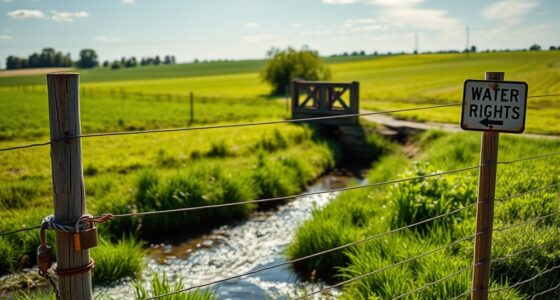Understanding organic farming means embracing a sustainable agricultural practice that uses natural inputs and avoids synthetic chemicals. You'll focus on maintaining soil fertility, promoting biodiversity, and ensuring ecosystem health. Key principles include enhancing the well-being of all living systems and responsible management for future generations. By incorporating practices like crop rotation and integrated pest management, you can improve the environment and create healthier food options. There's much more to explore about this thriving approach to agriculture.
Key Takeaways
- Organic farming is a sustainable agricultural practice that avoids synthetic chemicals, focusing on natural inputs to maintain ecosystem health.
- Key principles include health, ecology, fairness, and care, promoting well-being for soil, plants, animals, and humans.
- Common practices encompass crop rotation, cover cropping, integrated pest management, and rotational grazing to enhance biodiversity and soil fertility.
- Organic farming offers environmental benefits, such as reducing greenhouse gas emissions, conserving water, and preserving natural habitats.
- Challenges include weed and disease management, certification costs, and market access, but technology integration is improving sustainability and efficiency.
What Is Organic Farming?
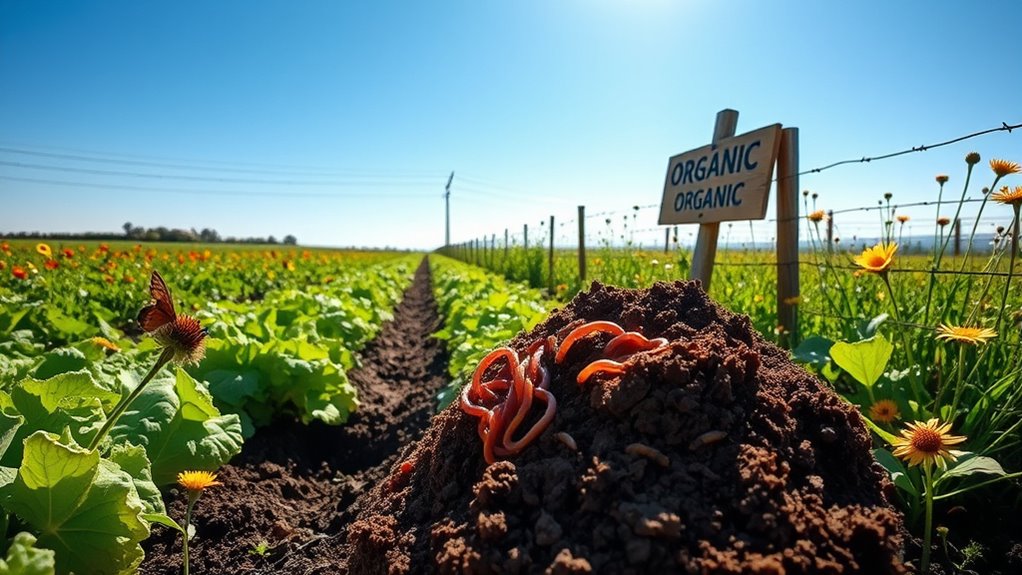
Organic farming is a sustainable agricultural practice that focuses on using natural inputs while avoiding synthetic chemicals like pesticides and fertilizers. This method aims to maintain soil fertility, promote biodiversity, and ensure ecosystem health.
Organic farming emphasizes natural inputs over synthetic chemicals, fostering soil fertility, biodiversity, and overall ecosystem health.
You'll find that organic farming covers millions of hectares globally, with significant regions in countries like Australia. It emerged in the early 20th century as a response to changing agricultural practices.
To achieve its goals, organic farming employs techniques like crop rotation, biological pest control, and composting. These methods help build soil health, reduce water pollution, and support natural ecosystems.
Plus, organic products must meet strict regulatory standards, such as those set by the USDA in the U.S., ensuring quality and consistency.
Key Principles of Organic Farming

Sustainability in agriculture hinges on a set of key principles that guide organic farming practices.
First, the health principle emphasizes enhancing the well-being of soil, plants, animals, humans, and the planet.
Next, the ecology principle encourages you to work with living systems and cycles to maintain ecological balance.
The fairness principle ensures equitable relationships regarding environmental and social opportunities.
Additionally, the care principle advocates for responsible management to protect future generations.
These principles not only promote environmental health but also support biodiversity, improve water quality, and reduce greenhouse gas emissions.
Common Organic Farming Practices
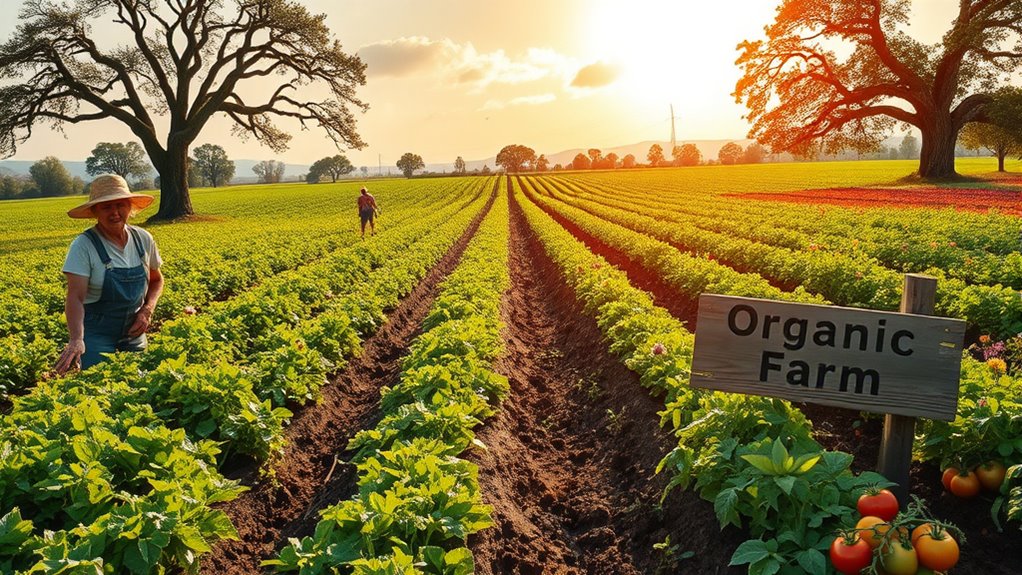
While embracing organic farming, you'll discover a variety of common practices that prioritize ecological balance and soil health.
Crop rotation replenishes soil nutrients and disrupts pest habitats, while cover cropping prevents erosion and enriches the soil. You can enhance soil quality by incorporating green manures and using composted animal manures.
For pest and weed management, integrated pest management (IPM) combines biological and physical methods, utilizing beneficial insects and natural barriers.
In livestock management, rotational grazing optimizes pasture growth, and organic feed ensures livestock health without synthetic additives.
Finally, crop diversity through mixed cropping and companion planting boosts biodiversity, while seasonal planning and record-keeping help maintain your organic certification.
These practices form the backbone of successful organic farming.
Environmental Benefits of Organic Farming
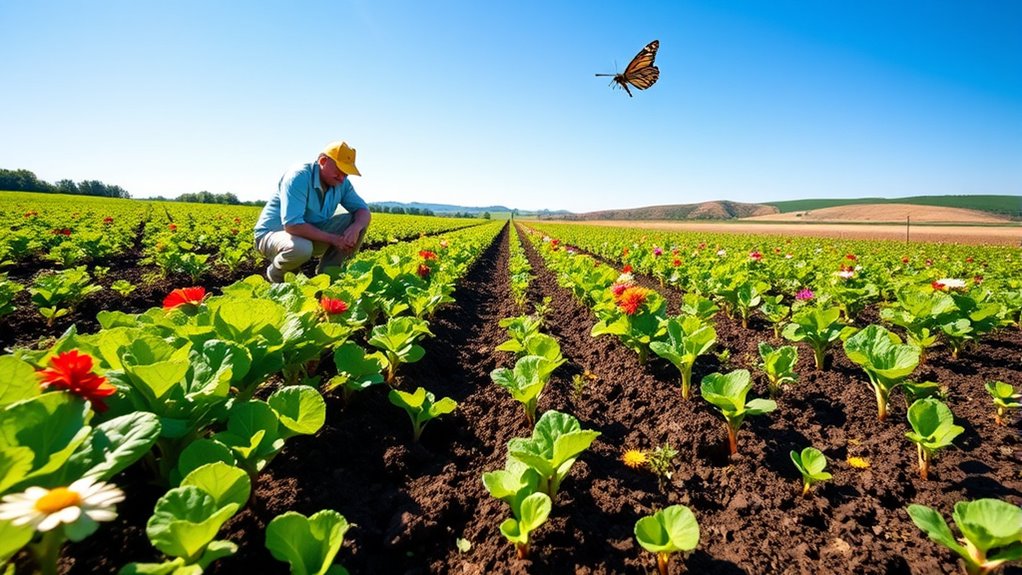
When you choose organic farming, you not only support your health but also contribute to a healthier environment.
By limiting synthetic fertilizers, you reduce greenhouse gas emissions and minimize pollution in soils and waterways. Your methods enhance soil fertility through composting and crop rotation, which helps combat erosion and improves biodiversity.
With organic practices, you conserve water using techniques like drip irrigation, protecting both groundwater and aquatic ecosystems. Additionally, organic farms create habitats for diverse species and promote ecological balance, preserving vital natural ecosystems.
Nutritional Advantages of Organic Foods
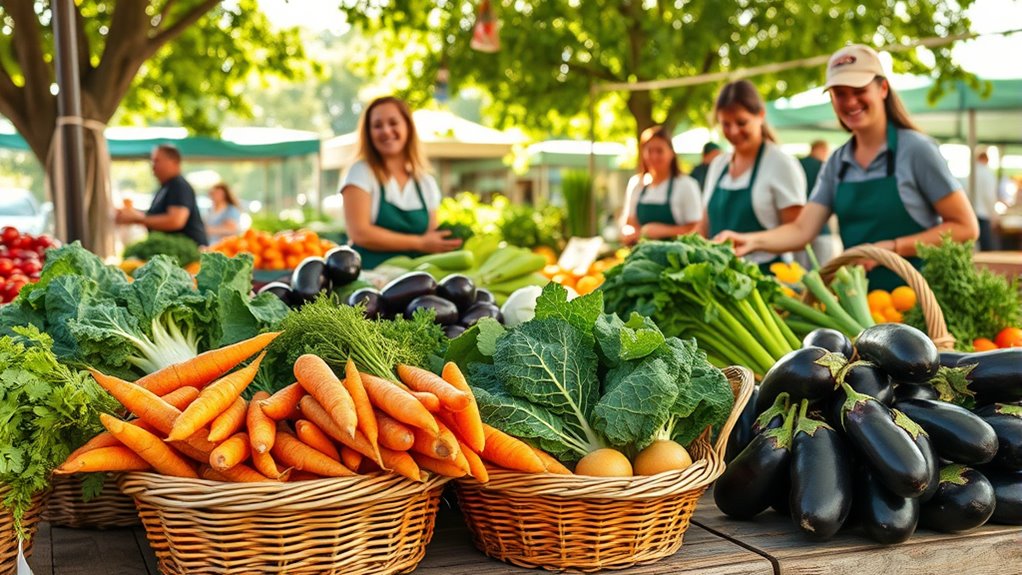
Organic foods offer a wealth of nutritional advantages that can significantly benefit your health. They often contain higher levels of antioxidants, helping protect against cell damage.
You'll also find increased amounts of vitamins and minerals, like vitamin C, zinc, and iron. Plus, organic produce generally has lower nitrate levels, which may reduce certain health risks.
When it comes to dairy and meat, you'll enjoy more beneficial fatty acids, including higher omega-3 levels. Reduced pesticide residues mean less exposure to harmful chemicals.
These factors contribute to potential health benefits, such as lowering cancer risk, reducing obesity, and supporting immune function. By choosing organic, you're making a proactive choice for your health and well-being.
Challenges Faced by Organic Farmers
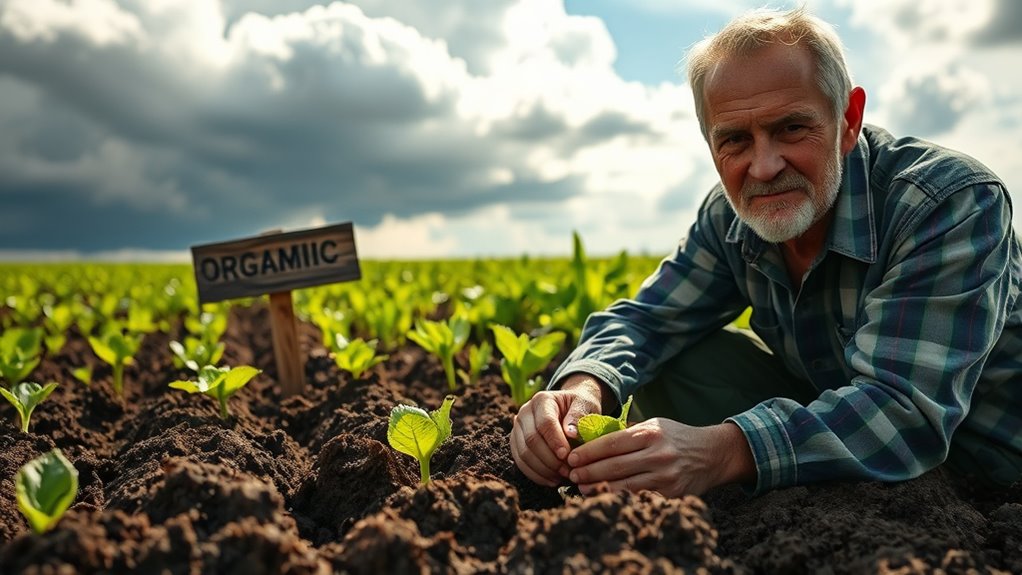
Choosing organic foods can have significant health benefits, but the journey to produce them isn't without hurdles.
You'll face challenges like weed management, as 67% of organic farmers struggle without synthetic herbicides. Disease control requires proactive strategies, complicating your farming efforts.
Maintaining soil health is crucial, especially during the transition to organic practices, which often leads to lower crop yields and affects profitability. Certification costs can add financial strain, and the three-year transition period may result in losses.
Accessing mainstream markets is tough due to higher production costs and limited financial support. Additionally, you need innovative strategies and continuous education to overcome these obstacles and thrive in organic farming. Implementing practices like water purification can also help in maintaining a sustainable farming environment.
Global Trends in Organic Farming
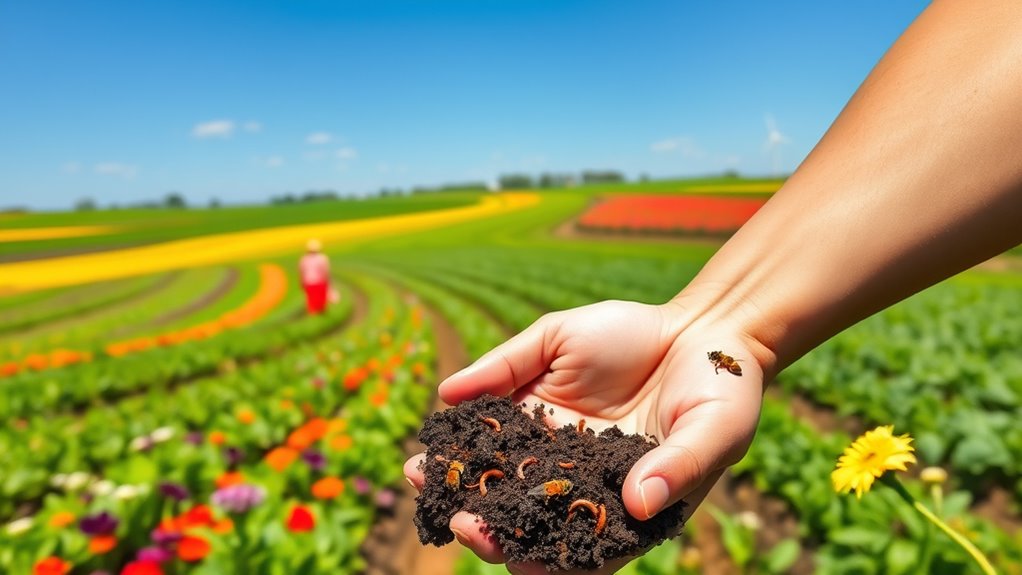
As the demand for sustainable food options grows, global trends in organic farming are evolving rapidly.
In 2022, the organic farming area expanded by over 20 million hectares, reaching a total of 96 million. Australia leads with 53 million hectares, while India follows with significant growth to 4.7 million hectares.
Worldwide, the number of organic producers exceeded 4.5 million, with India having the most at 2.5 million.
The global organic market surged to nearly 135 billion euros, with the U.S. as the top consumer.
As organic farming gains traction across continents, supportive policies and regulations are emerging, fostering an environment conducive to further growth and innovation in the organic sector.
The Importance of Certification
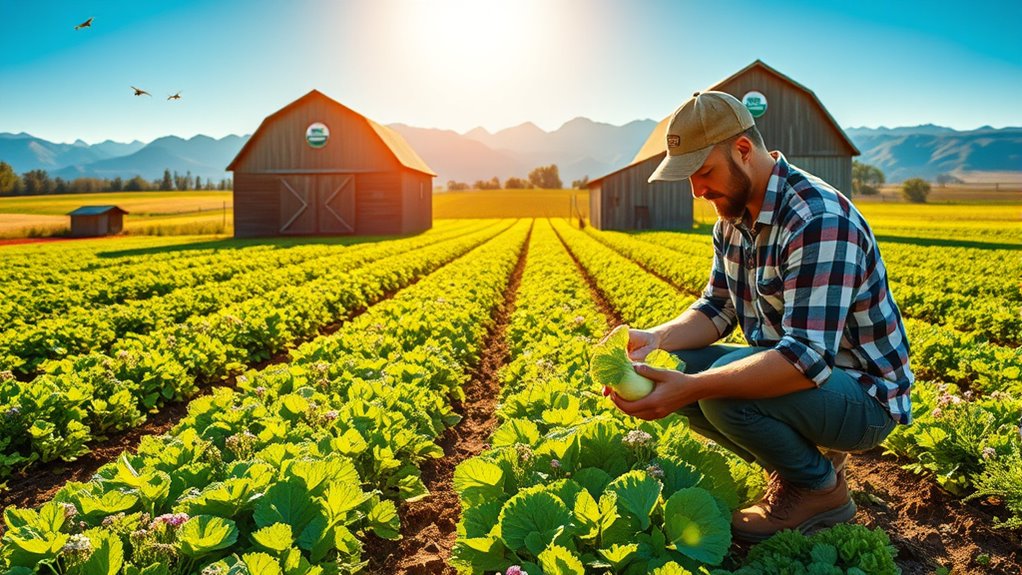
Certification plays a crucial role in the organic farming industry, ensuring that products meet stringent standards and providing consumers with confidence in their purchases. When you choose certified organic products, you can trust that they adhere to strict guidelines for safety and quality.
This certification not only opens up market access but also allows producers to command higher prices, benefiting local economies. With regular inspections and thorough record-keeping, certifying bodies maintain transparency and enforce compliance, ensuring that farming practices are sustainable.
The Future of Organic Agriculture
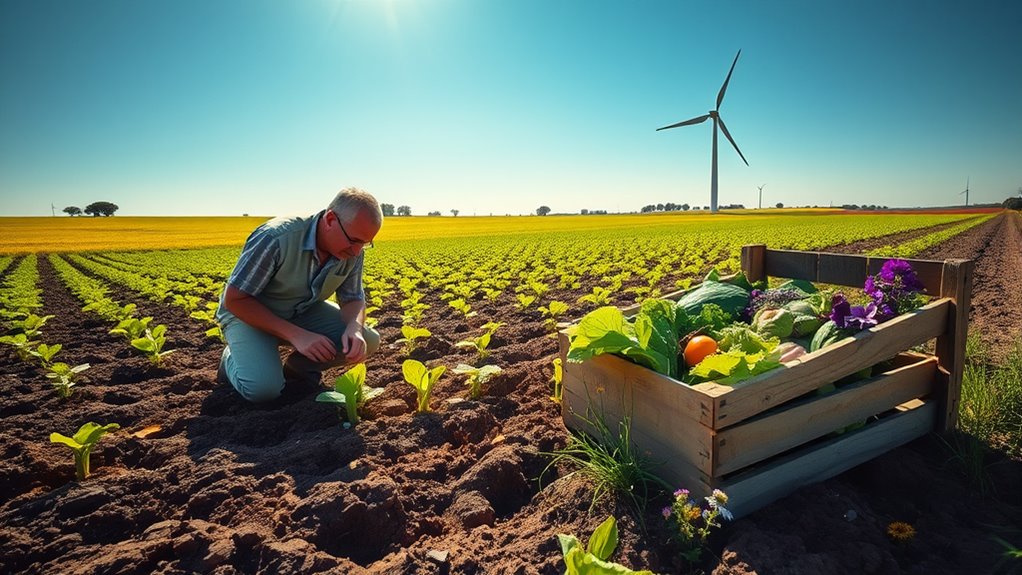
The future of organic agriculture looks promising, fueled by increasing consumer demand for healthier and more sustainable food options.
By 2032, the organic food market is projected to reach $546.97 billion, with significant growth in regions like the U.S. and China. Innovations like precision agriculture and smart pest management are making organic farming more efficient and cost-effective. Additionally, incorporating nutritional benefits into farming practices can further enhance the appeal of organic products to health-conscious consumers. Furthermore, adopting sustainable practices can lead to improved resource efficiency and reduced environmental impact.
Consumers are driving this transformation, favoring organic products and encouraging farmers to adopt sustainable practices. Moreover, organic farming enhances soil health, conserves water, and mitigates climate change. Additionally, the integration of solar technology into farming practices is helping to reduce energy costs and improve sustainability.
As awareness grows and investment in research continues, you'll see even more opportunities arise in this thriving sector, ensuring a more sustainable future for agriculture.
Frequently Asked Questions
How Can I Start My Own Organic Farm?
To start your own organic farm, begin by selecting suitable land with good soil and climate.
Assess your soil and develop a business plan outlining your crops, costs, and marketing.
Research organic certification requirements and invest in necessary equipment.
Implement practices like crop rotation and composting for sustainability.
Set up efficient irrigation and storage.
Finally, engage with your community and establish marketing strategies to sell your products directly to consumers.
What Are the Costs Associated With Organic Farming?
When you consider starting an organic farm, you'll face several costs.
Higher labor expenses arise from managing pests and weeds without chemicals. Smaller farm sizes mean you won't benefit from economies of scale, leading to increased processing costs.
You'll also need to budget for certification fees. Furthermore, organic products often have fluctuating prices, making it crucial to stay competitive.
Despite these challenges, the growing demand for organic goods offers potential rewards.
Are Organic Products Always Pesticide-Free?
You might wish for organic products to be completely pesticide-free, but that's not always the case.
While organic farming dramatically reduces pesticide use, some low-toxicity substances are permitted under strict regulations.
Essentially, you're choosing a safer option with fewer chemicals, but not every organic item is entirely devoid of pesticides.
It's about finding a balance between health and environmental impact, leading you toward a more sustainable choice in your food.
How Can I Find Certified Organic Farms Near Me?
To find certified organic farms near you, start by visiting LocalHarvest.org, where you can search for farms in your area.
Many farms also participate in Community Supported Agriculture (CSA) programs or local farmers' markets, so check those out too.
You might find online directories that list organic farms by region, and some farms even offer delivery services.
Connecting with local agricultural associations can also help you discover nearby certified options.
What Role Do Consumers Play in Organic Farming?
You play a crucial role in organic farming by driving demand for sustainable practices.
When you choose organic products, you support local farmers and promote environmentally friendly methods.
Your preferences influence what farmers grow, encouraging them to adopt practices that align with your values, like biodiversity and chemical-free cultivation.
Conclusion
In the world of organic farming, you're not just growing food; you're cultivating a healthier planet and a better future. As the saying goes, "You reap what you sow." By embracing organic practices, you contribute to environmental sustainability and enjoy the nutritional benefits of organic foods. Despite the challenges, the growth of organic agriculture continues to rise, promising a brighter, greener tomorrow. So, let's support organic farming and nurture our connection with the earth.

